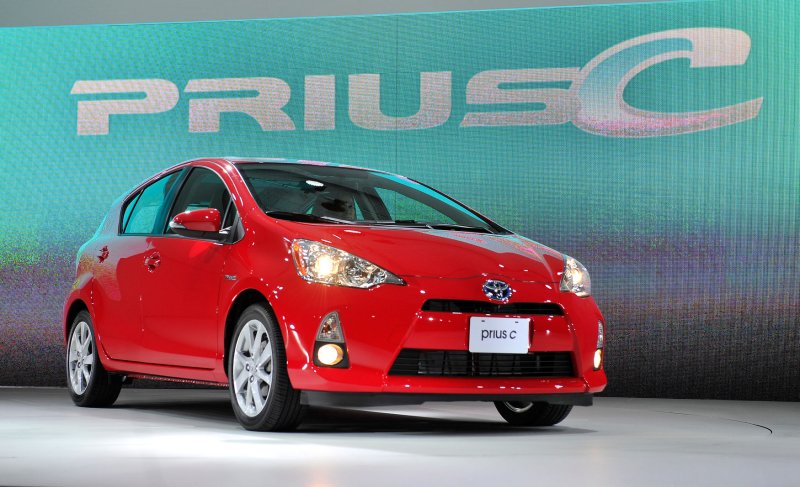Toyota introduces the Prius C at the 2012 North American International Auto Show on January 10, 2012 in Detroit. UPI/Brian Kersey |
License Photo
Conservative naysayers will have a field day in Detroit this week watching a parade of hybrid cars on display they say consumers may be hesitant to buy.
If only it were so easy -- or so patriotic -- to buy a gas-sipping hybrid, such as the plug-in Chevrolet Volt or the Ford Fusion with EcoBoost technology that gobbles up miles, not gas, getting 37 mpg.
It might even be considered patriotic to buy a plug-in Nissan Leaf, not because of where it was built -- Smyrna, Tenn., or Japan -- or where the money goes, but because it cuts down on U.S. petroleum imports and, by extension, harmful greenhouse gases -- a mildly patriotic gesture.
It turns out muscle cars and trucks are still more patriotic than saving a few quarts of gasoline each day.
Automakers are surely caught in the middle. Estimates say research and development costs for a new vehicle is roughly $1 billion, making the development of a fuel-efficient vehicle more than an idle whim. It is a commitment, and that commitment is on display at the International Auto Show in Detroit.
Volvo Cars is displaying the XC60 plug-in hybrid concept car. Honda, BMW, Volkswagen, Mercedes, and Chrysler are also putting hybrid technology on display with an interesting headline at stake: The more fuel efficient, the bigger the headline. It's that simple. Thrift on the front page. Who knew?
But wait: At least two fundamental problems are in play here. In the first place, sales of hybrids have been disappointing. They even fell in 2011 to 2.2 percent of all sales, down from 2.4 percent in the previous year, research firm LMC Automotive said.
Nissan sold 9,700 all-electric cars in 2011 – the Nissan Leaf -- which was launched last year. Sales of General Motors Volts fell 10,000 short of GM's target and Chief Executive Officer Dan Akerson, in a pragmatic statement, said the company would match production to demand. That seems reasonable enough.
But if costs go down when production bulks up, it will be a slow road for the Volt if measured by costs per vehicle.
Secondly, of course, it is still more profitable to build and sell a truck. Mileage be damned, $4 per gallon gasoline is something consumers appear happier to adapt to than driving a lightweight hybrid.
So, consumers are addicted to big cars and big trucks in part because automakers are motivated by big bucks. It's that simple.
A car company asking consumers to buy an electric car is similar to a beer company asking consumers to cut back on their drinking. On paper, it makes no sense at all.
But research and development costs of $1 billion can buy a lot of sincerity and research analysts say gas-sippers are here to stay. The problem is reluctance.
"The market is going in one direction and fuel-economy regulations are going the other direction," Jeremy Anwyl, vice chairman of the automotive information Web site Edmunds.com, told The New York Times.
"Just because people start building more of something doesn't mean the segment grows," he said.
In International markets Tuesday, the Nikkei 225 index in Japan rose 0.38 percent, while the Shanghai composite index in China gained 2.69 percent. The Hang Seng index in Hong Kong rose 0.73 percent, while the Sensex in India rose 2.22 percent.
The S&P/ASX 200 in Australia added 1.14 percent.
In midday trading in Europe, the FTSE 100 index added 1.51 percent, while the DAX 30 in Germany rose 2.63 percent. The CAC 40 in France gained 2.74 percent, while the Stoxx Europe 600 gained 1.77 percent.















